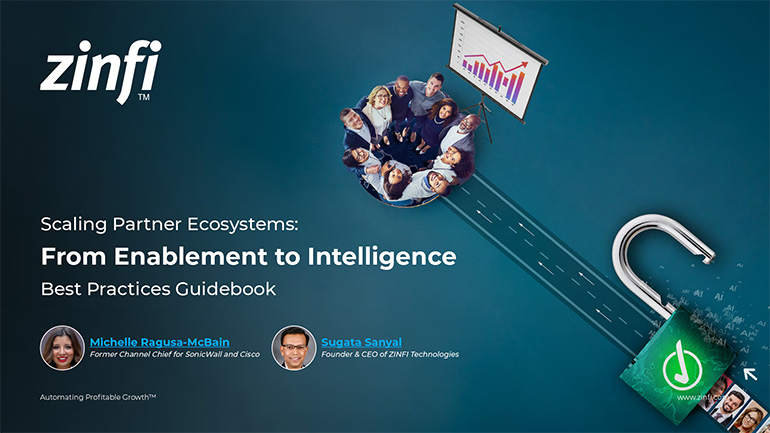Glossary - What is - Automated Channel Management Tools
What are Automated Channel Management Tools?
Automated channel management tools are software solutions designed to streamline and optimize the processes of managing indirect sales channels, such as resellers, distributors, and affiliates. These tools automate tasks like lead distribution, deal registration, partner onboarding, performance tracking, and marketing activities, reducing the business’s and its partners’ manual workload. By providing a centralized platform for managing partner relationships, automated channel management tools help organizations improve collaboration, enhance partner engagement, and ultimately increase revenue through indirect sales channels.
Automated channel management tools are essential in partner ecosystem and partner management automation. They enable businesses to automate time-consuming tasks such as partner communication, resource sharing, and performance tracking. With real-time visibility into partner activities, companies can make data-driven decisions to optimize their channel strategies. Additionally, these tools allow for scalable management of large and diverse partner ecosystems, ensuring companies can grow their channel networks efficiently without sacrificing quality or consistency.
Key Takeaways:
- Efficient Partner Onboarding and Training: Automated channel management tools streamline the onboarding process by automating workflows for recruiting, training, and certifying new partners. Through self-service portals and online learning modules, partners can quickly access training resources and become certified to sell the company’s products. This reduces the time it takes for partners to become fully operational, improving their readiness and ability to drive sales. ZINFI’s platform includes robust partner onboarding features that automate training and certification, ensuring that partners are equipped adequately from day one. Learn more about ZINFI’s partner onboarding tools.
- Lead Distribution and Deal Registration Automation: One of the key benefits of automated channel management tools is the automation of lead distribution and deal registration. These tools ensure leads are quickly routed to the right partners, minimizing delays and improving lead conversion rates. Additionally, deal registration workflows provide transparency in the sales process, reducing conflicts between partners and ensuring proper credit for closed deals. ZINFI’s platform automates lead management and deal registration, allowing partners to act on opportunities faster while improving overall channel sales efficiency. Visit ZINFI’s lead management page for more information.
- Enhanced Partner Engagement and Communication: With automated communication features, channel management tools help maintain regular partner engagement by providing access to marketing resources, product updates, and sales collateral. Partners can easily access these materials through self-service portals, enabling them to co-brand and customize content for their target markets. This increases the effectiveness of joint marketing campaigns and ensures partners are aligned with the company’s brand and messaging. ZINFI’s platform offers comprehensive tools for ongoing partner engagement and communication, enhancing collaboration and driving mutual success. Explore ZINFI’s partner engagement solutions.
- Real-Time Analytics and Performance Monitoring: Automated channel management tools provide real-time insights into partner performance through dashboards and reporting features. This allows businesses to monitor sales activity, track Key Performance Indicators (KPIs), and identify top-performing partners. With access to these insights, companies can make data-driven decisions, allocate resources more effectively, and provide additional support to underperforming partners. ZINFI’s platform includes advanced analytics tools that offer detailed reporting on partner performance, helping organizations optimize their channel strategies.
- Scalability and Automation for Growing Partner Networks: Managing many partners can become increasingly complex as businesses expand. Automated channel management tools offer scalability by allowing enterprises to manage a growing partner ecosystem without adding significant overhead. These tools automate repetitive tasks such as partner onboarding, deal management, and reporting, ensuring businesses can continue to scale efficiently while maintaining high levels of partner support and engagement. ZINFI’s platform is designed for scalability, providing organizations with flexible and customizable workflows to manage large and diverse partner networks.
Summary of Key Takeaways:
Automated channel management tools streamline partner management processes, enabling businesses to engage with their partners more effectively, automate critical workflows, and track real-time performance. These tools are essential for scaling partner ecosystems while maintaining consistency and efficiency.
Key Examples:
- Automotive Manufacturing: In the automotive industry, manufacturers rely on dealerships and third-party resellers to sell vehicles and offer post-sale services. Automated channel management tools help manage these relationships by automating lead distribution, tracking dealership performance, and providing co-branded marketing assets. With real-time sales performance data, automotive manufacturers can respond quickly to market changes and optimize dealer engagement. These tools also automate the onboarding and certification of dealership staff, ensuring they have the knowledge needed to succeed in sales and customer support.
- Consumer Electronics: Electronics companies often have complex distribution networks spanning multiple regions. Automated channel management tools help these companies manage relationships with distributors and retailers by automating product updates, inventory management, and marketing promotions. The tools also provide real-time analytics on sales performance, allowing companies to make data-driven decisions about pricing and product availability. Automated co-marketing features enable consumer electronics brands to collaborate with retailers on joint promotions, helping increase product visibility and drive sales.
- Energy Production: In the energy sector, automated channel management tools manage relationships with service providers responsible for installing and maintaining renewable energy solutions like solar panels and wind turbines. These tools automate the distribution of technical documentation, track partner performance, and ensure compliance with regulatory standards. By automating these processes, energy producers can maintain high service quality and ensure that installations are performed safely and efficiently. The tools also provide real-time insights into the performance of service providers, helping energy companies optimize their partner networks.
- Financial Services: Financial institutions like banks and insurance companies often rely on brokers and agents to sell their products. Automated channel management tools help financial service providers manage these relationships by automating commission payments, deal registration, and compliance monitoring. The tools also provide brokers and agents access to training and certification programs, ensuring they are current on the latest products and regulatory requirements. By automating these processes, financial institutions can improve partner performance and maintain compliance with industry standards.
- Food and Beverage: Food and beverage manufacturers often work with distributors and retailers to bring their products to market. Automated channel management tools help these companies manage their partner relationships by automating inventory tracking, sales performance monitoring, and marketing collaboration. With real-time product availability and sales data, food and beverage manufacturers can optimize their supply chain and ensure that products are consistently available to consumers. These tools also facilitate joint marketing campaigns with retailers, improving brand visibility and increasing sales at the point of purchase.
- Healthcare Services: Healthcare organizations, including medical device manufacturers and pharmaceutical companies, work with distributors, clinics, and hospitals to provide their products and services. Automated channel management tools help healthcare companies manage these relationships by automating the distribution of product information, training materials, and compliance certifications. The tools also provide real-time insights into partner performance, ensuring that partners adhere to regulatory requirements and deliver high-quality care to patients. By streamlining these processes, healthcare companies can improve service delivery and patient outcomes.
- Information Technology: IT companies rely on Value-Added Resellers (VARs), system integrators, and Managed Service Providers (MSPs) to implement and sell their solutions. Automated channel management tools enable IT vendors to manage these partner relationships by automating deal registration, co-marketing activities, and product training. The tools also offer detailed analytics on partner performance, allowing IT vendors to identify top-performing partners and allocate resources more effectively. By automating these processes, IT companies can increase partner engagement and expand their market reach more efficiently.
- Pharmaceutical Development: Pharmaceutical companies distribute medications and medical devices with distributors, healthcare providers, and pharmacies. Automated channel management tools ensure these relationships are managed efficiently by automating compliance tracking, product distribution, and performance monitoring. These tools also provide partners access to the latest research, clinical trial results, and training resources, ensuring they can deliver the best possible care to patients. By streamlining these processes, pharmaceutical companies can provide better health outcomes and optimize their partner networks.
- Retail Industry: In retail, companies work with distributors, wholesalers, and online marketplaces to expand their market reach. Automated channel management tools help retailers manage their partner relationships by automating inventory management, pricing updates, and co-branded marketing campaigns. Real-time analytics allow retailers to track sales trends and optimize their supply chains based on demand. These tools also support collaboration on joint marketing initiatives, helping retailers and their partners drive product visibility and increase sales across multiple channels.
- Telecommunications: Telecommunications providers rely on resellers and service providers to deliver bundled services like internet, cable, and phone packages. Automated channel management tools streamline the management of these relationships by automating lead distribution, deal registration, and partner training. These tools also provide analytics on customer acquisition and sales performance, helping telecom companies optimize their channel strategies. By automating these processes, telecom providers can improve partner engagement, expand their market reach, and enhance customer satisfaction.
Conclusion:
Automated channel management tools are essential for businesses with indirect sales channels. By automating key processes such as partner onboarding, lead distribution, deal registration, and performance tracking, these tools enable companies to manage their partner networks more efficiently and effectively.
The examples from industries such as automotive manufacturing, consumer electronics, healthcare services, and telecommunications demonstrate how automated channel management tools can optimize partner relationships, improve collaboration, and drive business growth. These tools allow businesses to scale their partner ecosystems without sacrificing efficiency or service quality, making them a critical asset for organizations looking to expand their market reach through indirect channels.
Associated Keywords:
- Channel Automation Tools
- Partner Management Software
- Automated Partner Relationship Management















